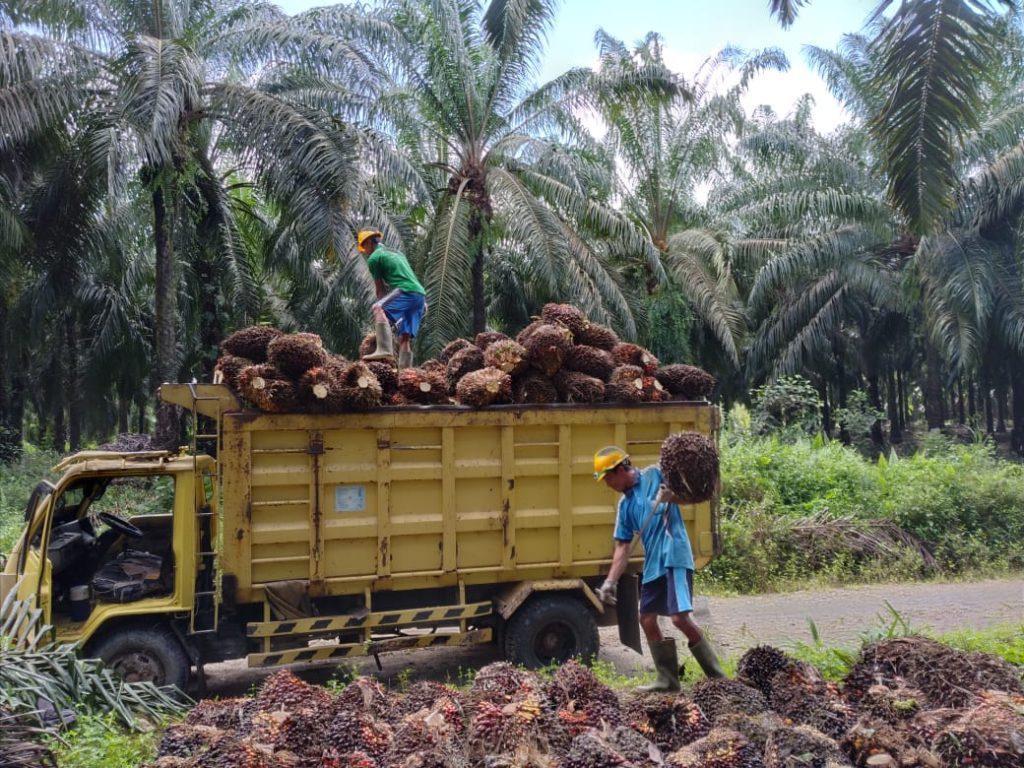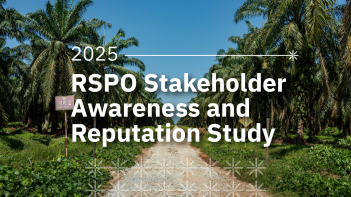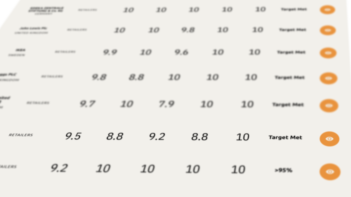By: Ruben Brunsveld, Deputy Director Market Transformation, RSPO
(As first published in edie on 14 April 2025)
A few years ago, several large companies pledged to exclude palm oil from their products over sustainability concerns. How have things changed? The Roundtable on Sustainable Palm Oil’s (RSPO) Ruben Brunsveld busts three persistent myths in this new and exclusive op-ed.

Myths and misconceptions about palm oil undermine sustainability efforts and damage the reputation of responsible companies. Palm oil is the world’s most widely used vegetable oil, found in around half of all supermarket products.
But despite being highly productive and versatile, the public debate around it remains unnuanced and uninformed.
Although global deforestation peaked in the 1980s and has steadily declined since then, it’s true that new oil palm plantations are still contributing to deforestation and biodiversity loss.
The UN FAO estimates that in total 10 million hectares of forest are cut down each year, an area equivalent to 40% of the UK or more than 38,000 football pitches each day. According to an impact assessment conducted by the European Commission, palm oil is responsible for 8% of this deforestation. Since 85% – 90% of the global production comes from only two countries (Malaysia and Indonesia) the impact on them is significantly higher.
However, it’s important to remind ourselves that when grown under the right conditions, oil palm cultivation can improve livelihoods and contribute to preserving forests and high conservation areas. It is also an important factor in feeding the growing global population. To meet the demand, the USDA forecasts a 2.7 million tonne year-on-year rise in the production of vegetable oils. Striking this balance between fulfilling the needs of a growing population and protecting our planet is not easy but one thing is clear: palm oil will play a major role. So we better make sure it’s produced in a sustainable manner.
This article busts three myths about sustainability in palm oil supply chains.
Myth 1: Palm oil cannot be produced without exploiting workers and farmers
One of the most common myths is that palm oil production is inherently exploitative. But sustainable palm oil production means improving the welfare and livelihoods of workers and smallholder farmers.
Certified plantations that comply with the RSPO Standards must adhere to labour rights regulations, ensure fair wages, working conditions, adequate housing and medical amenities to national standards or above.
Smallholders who adopt certifications like RPSO have the opportunity to access international markets that offer a premium for sustainably produced commodities and are supported to adopt better agricultural management practices, leading to higher yields and more income. This leads to certified scheme smallholders being on average 35% more profitable than non-certified scheme smallholders. Similarly, independent certified smallholders earn 89% more than non-certified independent smallholders.
Myth 2: All palm oil production leads to deforestation and destroying wildlife
It is not the product, it is how you produce it. Different approaches to production could harm, conserve or even improve ecosystems.
The RSPO Standards require no deforestation and the protection of High Conservation Value (HCV) areas; members are required to proactively conserve biodiversity.
In 2023, the Lubuk Larangan River in Jambi’s Tanjung Jabung Barat Regency reopened following a five-year conservation project led by RSPO Certified independent smallholders. With government support, they enforced fishing and pollution bans and utilised funds from the revenue they earned selling RSPO Independent Smallholder Credits to restore riparian areas, restock fish, and support river guardians. RSPO Certified Sustainable Palm Oil (CSPO) has a 20% lower biodiversity impact from land-use changes compared to non-certified palm oil produced in Indonesia and Malaysia.
The European Union Deforestation Regulation (EUDR) now obliges companies from the 29th of December 2025 to show exactly where palm oil (and six other commodities) comes from; that it is produced per the laws of the producing country and – very importantly – that it is deforestation-free. This regulation is a milestone, which RSPO supports.
88% of all the palm oil coming into Europe for food, feed and oleochemicals is RSPO Certified, thus going beyond the EUDR regulation. While EUDR only addresses legality, deforestation and traceability. RSPO Certification encompasses many more social and environmental safeguards. These include biodiversity protection, fair labour practices, community rights, and pesticide and water- management, thus ensuring a holistic and integrated approach to sustainability.
Myth 3: Other vegetable oils are more sustainable than palm oil
One of the most frequent arguments against palm oil is that other vegetable oils offer a more environmentally friendly alternative. This is not true. Substituting palm oil with other vegetable oil crops isn’t a viable solution because replacing palm oil with sunflower, soybean, or rapeseed oil could create bigger environmental and social challenges.
Palm oil is a very efficient oil; the yield per hectare is significantly higher compared to other vegetable oils. A study by WWF Germany found that if palm oil were to be replaced by rapeseed, sunflower, coconut and soybean oil, Germany would need up to five times as much cropland: 1.85 million hectares instead of 397,781 hectares. The same report found that in lots of cases, where coconut oil can replace palm oil this would lead to an additional 309 million tonnes of greenhouse gas emissions.
Is boycotting products with palm oil more sustainable?
Most sustainably produced palm oil is sold in Europe or North America. If these continents would stop using palm oil, production would not stop. Instead, palm oil would be sold to markets which do not have the same sustainability requirements. This would lead to more negative environmental and social impacts. Europe and North America demonstrate that there is a market willing to pay for a sustainable product and this production should be incentivised.
Advocating for responsible production and sourcing
Palm oil is not inherently bad, but how it’s produced is the key to its impact. Rather than eliminating palm oil, the solution lies in ensuring it’s always sustainably sourced; strengthening sustainability commitments, supporting certified production, and driving meaningful change across the industry.
The myths surrounding palm oil can lead to misguided procurement policies and consumer behaviour that do more harm than good.
A collaborative approach involving NGOs, academia, private companies and governments is needed to ensure the palm oil industry continues to work toward a more sustainable future.
Companies, for their part, must commit to sourcing certified palm oil. This is particularly crucial in Europe, with EUDR in mind. On 21 May 2025, the RSPO, IDH and the Action for Sustainable Derivatives will bring the sustainable palm oil sector in Europe together in Paris during the Sustainable Palm Oil Dialogue to keep the discussion going on how we can connect the dots, to create an even more sustainable path forward. I gladly invite you to join the conversation!
Keep reading

Good News: RT2025 Early Bird Registration Extended!

Extension of RSPO Excellence Awards 2025 Submission Deadline!
Call for Expression of Interest: Ghana National Interpretation Task Force for 2024 RSPO Principles and Criteria (RSPO P&C)
Call for Expression of Interest: Côte D’Ivoire National Interpretation Task Force for 2024 RSPO Principles and Criteria (RSPO P&C) and Independent Smallholder (ISH) Standard

RSPO Gains Global Recognition in 2025 Stakeholder Study

Top 9 Retailers In Europe Committing To Sustainable Palm Oil

Register for RT2025 Early Bird Offer while it lasts!





